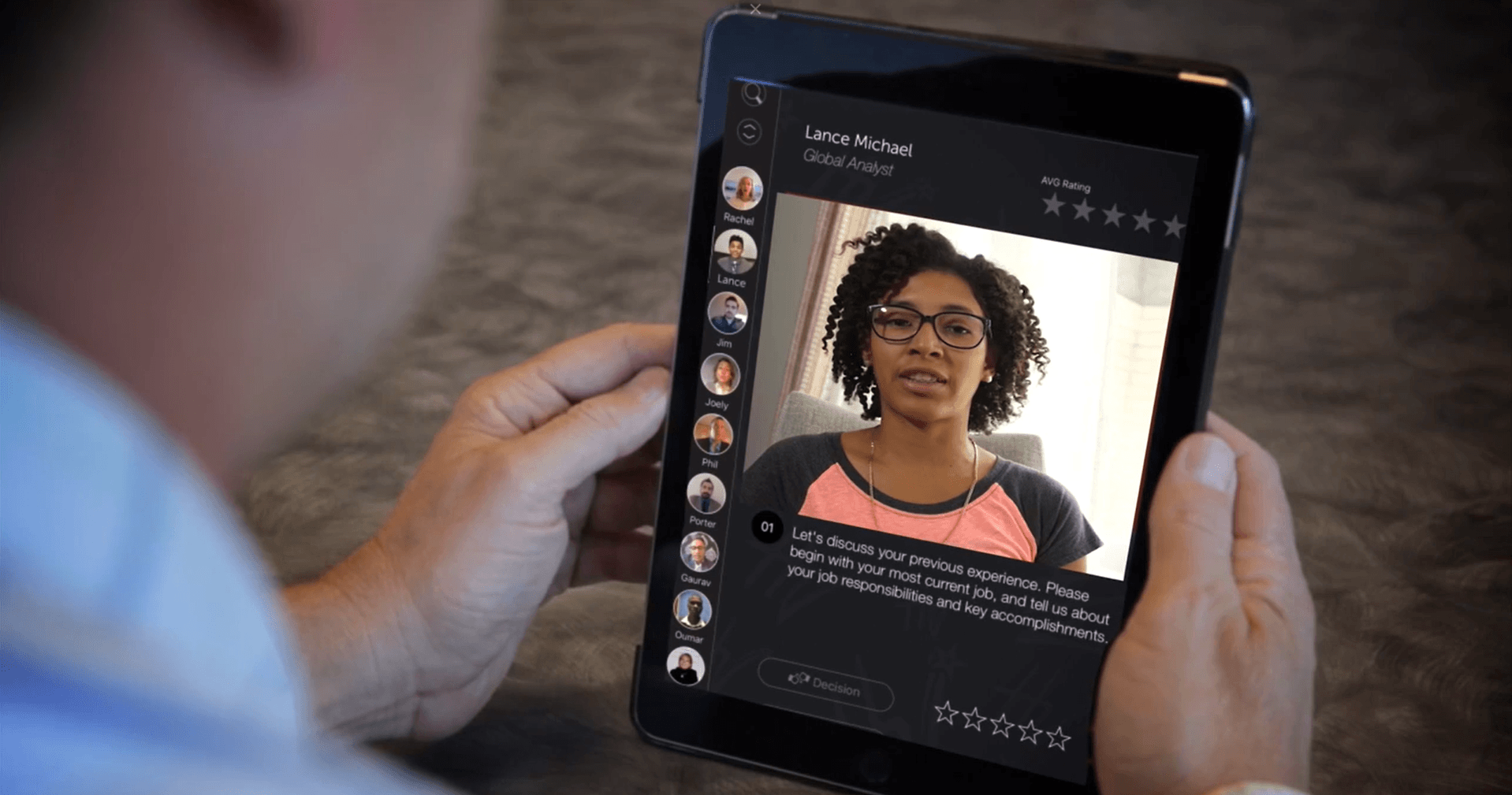Candidates: Are you interviewing and need support?
Video interviewing is so widespread these days it would not be entirely incorrect to call it the norm.
But despite the wide adoption of one-way video interview, materials on how to prepare for them are sparse.
Most interviewing guides are designed with one-on-one interviews in mind, and while these can provide general tips for their on-demand video counterparts, they fall short in critical areas. Here is a comprehensive guide to both one-on-one and one-way video interviews.
See How Hirevue OnDemand Helps Businesses Move Faster with the Best Candidates
What is an on-demand / one-way video interview?
A one-way video interview (also called on-demand, pre-recorded, or asynchronous interviews) is when pre-determined questions are facilitated by technology, rather than a traditional interviewer. Candidates will record answers to questions that are then submitted to a company.
Why do companies use one-way video interviews?
One-way video interviews are often used to accelerate the hiring process, remove scheduling barriers, reduce hiring bias, and provide a more flexible interview process for candidates. By allowing interviewers and interviewees alike to participate on their own time, one-way video interviews allow more candidates the opportunity to explain why they are right for a role. This standardizes the process, so every applicant is asked the same questions, making the hiring process fairer than traditional early-stage interviews.
What video interview technology will you need?
If you have received an invitation to take a video interview, there are several things you will need before accepting it.
Taking a video interview via computer:

You will need two things in order to take your video interview via computer:
- Adobe Flash Player. (click here to download the most recent version)
- A webcam. Most laptops now come with built-in webcams; but if your computer does not, you will need to purchase a USB-compatible webcam.
Ensure that your microphone and webcam are setup properly prior to accepting the interview invitation. You can do this easily at www.onlinemictest.com.
Taking an on-demand video interview via smartphone or tablet:

Most video interviewing platforms now offer their own app. To take a video interview with your smartphone, simply download the app and input your interview code.
What to expect during your one-way video interview?
If you receive an email invitation to interview on-demand, you should know what to expect going in.
On-demand interviews are not like one-on-ones, they do not have a live interviewer on the other end. Typically, you can think of these as one-way video interviews. Expect to respond to on-screen prompts, either through text or pre-recorded questions, rather than questions from a live recruiter or hiring manager.
There are several different methods companies use to deliver questions for one-way video interviews, so it’s best to be prepared for any of the following:
- Questions asked via pre-recorded video. After the video finishes, you will be given time (normally around 3 minutes) to respond.
- Questions asked in a simple text format. Normally 30 seconds are given for you to read the question and prepare your response.
- Questions requiring you to write (or draw). If you are applying for a role that involves a great deal of writing, expect to asked for a written response to a prompt. Often these will involve doing outside research – do not close the interview window! It will be helpful to first draft your response in Microsoft Word or another text editor, just in case.
- Coding challenges. If you are applying for a software development role, expect to be asked to code in response to a prompt. These challenges can be in any language- research what languages you will be expected to code in on the job. Be prepared to explain how and why you coded your responses in the way you did.
One-way video interview tips
Preparation is key to success for one-on-one, structured, and one-way video interviews. Know the ins and outs of the position you’re applying for, and understand where it fits into the big picture. Recognize the value it brings to the company – if you know this, it will be much easier to explain the value you bring to the position.
Dress appropriately. If you are unsure of what level of formality is expected, err on the side of caution. It is always better to be overdressed than underdressed.
Know your resume. You would be surprised at how many job candidates struggle to recall their duties in past positions, and how they are relevant to the position applied for. In the case of a video interview, you won’t be handing your resume to an interviewer, but you should still expect to answer questions related to past work experience.
Anticipate off the wall questions. Companies are using video interview technology to gauge skills and attributes they can’t with a resume. They want to see your personality and how well you can communicate and process your thoughts. Off the wall questions can give them insight into how well you can think and respond on the fly to unexpected situations. Here are a couple examples:
- Mercedes Benz internship applicants have been asked questions ranging from “If you were an animal, what animal would you be?” to “What would you do with a million dollars?”
- Urban Outfitters often asks applicants to draw a picture of themselves in the middle of the interview.
While these sorts of questions are not the norm, they are not unusual either – be prepared to think on your feet.
Practice speaking to your webcam. While you will be given the opportunity to practice in the interview, it may take longer for some to become accustomed to seeing themselves on camera.
What to remember while in the on-demand interview

While I really hope you’re not reading this while taking your interview, make sure to do these four things while taking a video interview:
- Speak clearly. Okay, this should be pretty obvious for any interview, but it is even more important for on-demand video interviews. Each question only provides a certain amount of time to respond, so it is critical to speak clearly and efficiently in order to make the most of the time you’re given.
- Focus on looking into the camera, not your own image. Looking at yourself while you respond can be distracting, and don’t be afraid to break eye contact when considering what to say next.
- Make the most of time you’re given to prepare. If you are at a computer, you not only have easy access to your resume, the entirety of the internet is at your disposal. Consider referencing company resources when putting together your response.
- Emote. This is another one that should be obvious – smile and display genuine interest in the position you’re applying for. Your video responses might be viewed by more than one recruiter or hiring manager, so it is important to make your answers as engaging as possible.
HireVue aims to enable your authentic self, not squander it! Take a look at this introduction to HireVue for more help.
On-demand interview questions and answers
Interview questions can often seem like trick questions, and properly navigating them is a crucial job-hunting skill. These are the most common “trick” interview questions and how to answer them:
- What is your biggest weakness? Countless articles have been written addressing how to answer this one question. Most people make the mistake of trying to spin a positive attribute as a weakness, for example: “I work so hard I never have any free time.” Unfortunately this question is not designed to see how well you can humble brag. Its purpose is to gauge your self-awareness, so answer honestly.
- Where do you see yourself in five (or ten) years? When asking this question, interviewers are looking for realistic ambition. Setting goals for yourself outside of the interview will allow you to answer this question honestly and beneficially.
- Why did you leave your previous job? If you are a college student or recent grad, this one is easy: “School.” If not, put a positive spin on why you left and don’t badmouth your previous employer.
- Why do you want to work here? This is where company research comes into play. Use this question as an opportunity to show off how much you know about the organization.
- Tell me about a time you failed. What matters when answering this question is not how you failed, but how you responded to failure. Interviewers want to see how well you are able to bounce back from a negative experience.
- Tell me about a time you had a conflict in the workplace. Again, what matters here is not so much the content of the conflict, but how you worked to resolve it after it occurred.
Of course, this list is not all-inclusive. If you’re looking for more interview questions and how to answer them, check out these articles.
Five of the most common interview questions and how to answer them
On campus video interviewing
Many companies are turning to on campus on-demand video interviewing, and even one-way video interviewing, in order to cut travel costs and hear from as many student applicants as possible. Not least of these is Goldman Sachs, who recently turned to on campus video interviewing as a way to identify strong candidates who do not attend one of their “target schools.”
For the average student, this is good news: it allows more organizations to visit each campus, increasing job opportunities across the board. So what should you do to prepare for an on campus video interview?
Register ahead of time. While video interviewing allows a great degree of flexibility when it comes to scheduling, job fairs can be hectic. If the organization you would like to interview with offers registration for a specific time slot, don’t hesitate to sign up. Most of the time each organization will have its own interview booth (though some will simply have an iPad).
Video interviewing on campus can be live or on-demand. While most of the same rules for on-demand interviewing apply to these, be prepared to answer specific pointed questions by a live interviewer.
It might be difficult to concentrate at a bustling, on campus job fair. Be prepared to make yourself heard above the noise (both literally and figuratively). Your peers are just as nervous as you are – displaying confidence and poise in a busy career fair environment will help you stand out.
If you interview at a video interview booth, anticipate quick feedback. Recruiters often watch video interviews immediately after you take them.
For the recent college graduate
If you are a yet-to-be-employed, recently graduated (or soon-to-graduate) college student, the job search probably doesn’t bring you a whole lot of joy. Resume after resume, cover letter after cover letter – it can feel like each application is quickly sucked into a black hole.
With most job descriptions requiring “2+ years related experience,” it is easy to wonder if most of these applications are a wasted effort. Perhaps, like most recent grads, you didn’t graduate with a stellar GPA or an Ivy League degree – what chance can you have against those that did?
On-demand video interviewing gives the average grad an advantage in a couple ways. We’ve already touched on the first: it gives employers insight into your personality and ability to think on the fly. While you might have no direct experience in the workplace, you can still display competitive attributes. The second is perhaps more important for the recent grad: it signifies the employer is willing to take a chance and hire “outside the box.”
Think about it this way: if an employer cared only about past experience and academic pedigree, they would only need a resume for their hiring decisions. By investing in a technology that provides a platform for candidates who don’t look great on paper to display their skills, they show that they are willing to invest in less experienced applicants.
Here are some tips to make the most of the opportunity an on-demand video interview provides:
- Make the most of extracurriculars. While being the “President of the Lacrosse Club” might not look amazing on paper, a video interview gives you the opportunity to delve into specifics. What sort of events did you organize? How did you organize them? What sort of communication was required between different campus groups? Thought-out answers to these questions show the employer that you are ready for a complicated workplace, despite a lack of work-related experience.
- Show off your knowledge of the company. If you are a soon-to-graduate college student, you probably have a great deal of experience performing research. Use the same methods you used to prepare for your senior seminar or final project to learn as much as you can about the company you are applying with. Most applicants will not take this extra step, and displaying knowledge of the company’s most recent endeavors and campaigns will help you stand out.
- Reflect on classwork. Was there a particularly difficult research paper that required you to go above and beyond? Perhaps a group project required every last ounce of patience and conflict mediation to pull together? These are instances that display perseverance and the ability to settle for nothing less than the best. In a workforce where many veterans become complacent, exhibiting this sort of drive can be a breath of fresh air for recruiting teams – and give you a leg up on the competition.
I think I blew it
If you feel this way after completing your first one-on-one or one-way video interview, don’t worry: everyone else feels the same way. Since there is no interviewer to provide nonverbal feedback after the interview’s completion, second-guessing yourself is very easy. Video interviewing is an entirely new medium for most applicants, so it is only natural to feel a little awkward. Don’t let it get you down, and know that every other applicant is in the same boat.
Need more help with your video interview? Check out our Candidate Help Center.



